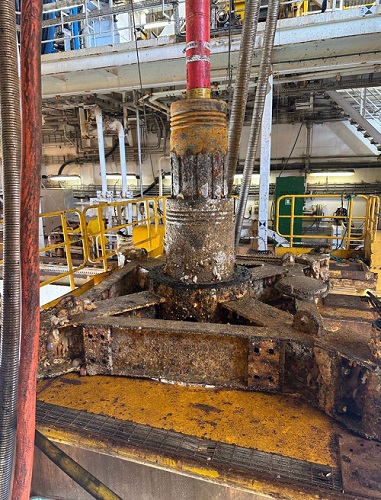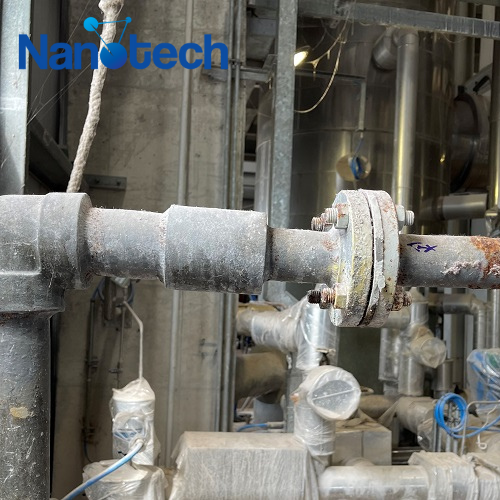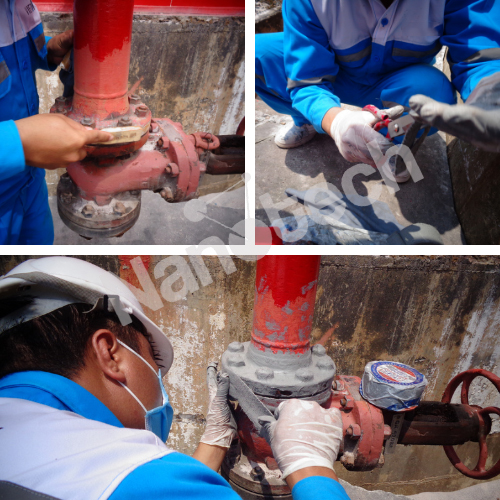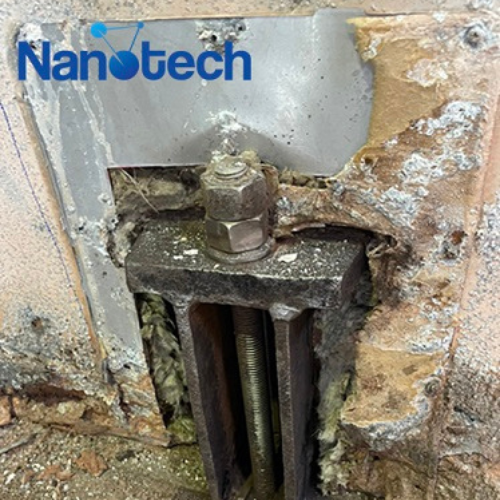Causes of pipeline corrosion
To take effective measures against pipe corrosion, you must first understand the source of the problem. So what is the cause, what is the reaction condition? Let’s go find the answer together now.
Our country has a hot and humid tropical monsoon climate, plus a long coastline, so it has created an ideal environment for high-speed metal wear. The following are the necessary – sufficient conditions to cause the phenomenon:
- The main agent is the presence of both water and oxygen elements.
- Pipeline equipment made of steel (Fe-C) in contact with water (or steam) and oxygen gas results in the following reaction:
3Fe + 4H2O = Fe3O4 + 4H2↑
3Fe + 2O2 = Fe3O4
Or cause a redox reaction in the electrolyte environment (low resistance soil, acid, alkali, salt, ..) to produce Fe3O4nH2O (rust). This process will produce a high-speed corrosion current.
- In some cases, this phenomenon can occur without the presence of oxygen. Especially the sulphate corrosive form. Elemental sulfur is produced by microorganisms that decompose organic impurities.
Distinguishing types of pipeline corrosion
Common types of pipeline corrosion today:
- Wide area corrosion: uniform corrosion rate on all surfaces, throughout the length of the pipeline. This phenomenon often occurs in pipes with old age or use of poor quality protective coating, low life and environmental conditions.
- Localized corrosion, pitting: corrosion reaction concentrated point by point on the pipe surface The cause is largely due to the quality of the coating or the installation process that caused scratches.
- Abrasive or mechanical corrosion: occurs mainly on the inside of the pipe. The transported fluids contain many impurities in contact with the pipe surface for a long time, causing wear.
- Corrosion in the form of stress: due to the compression process, ground loads, rocks, sand, etc., deform the pipeline. Add to that a combination of harmful agents from the environment.
Understanding the above classifications will help you more in preventing pipe corrosion. Because each form will correspond to different reaction rates and conditions. Please evaluate accurately to have the most effective treatment measures.
Coating – An effective method to prevent pipe corrosion
Pipeline corrosion causes a lot of economic loss. It also affects the performance of other industries. Therefore, in order to minimize damage and ensure long-term stability of the pipeline, we must take good precautions from the beginning. And coating is one of the most effective methods today that you should consider.
The requirements for the characteristics of the pipeline anti-corrosion coating to meet specific standards are as follows
- Excellent resistance to water, oxygen, etc.
- Good electrical and electrical insulation.
- High adhesion to pipe surfaces.
- Excellent mechanical and chemical resistance, long lasting.
- Comfortable impact resistance.
- Good resistance to corrosion, scratches, .. before harmful agents from the environment or transportation, construction, installation, etc.
- Effective resistance to soil changes and thermal stress.
- High resistance to cracking.
Types of coatings used to prevent pipe corrosion:
Lớp phủ nhựa than bitum:
Coal bitumen coating: The disadvantages are low strength, poor impact resistance, easy scratches during installation, and toxic solvents. This type of coating has been around for a long time, but it is very limited or the least used.
Epoxy base coating:
Today’s popular application, easy construction. The disadvantage is poor impact resistance, brittle, fast cracking, unstable when temperature changes suddenly. The average lifespan is 10 to 15 years.
Polyethylene jacketing coating:
This is a method of wrapping around the pipe leaving many joints, which can be scratched, torn or damaged during installation. This coating will soften at 80 degrees Celsius and melt when encountering a temperature range of 100 – 110 degrees Celsius. The application is quite limited.
Polyurea coating:
Most popular around the world since the last 30 years. It is widely used for anti-corrosion systems for clean water, oil, gas, sewage and other industrial applications. Especially possessing many outstanding advantages over the coatings mentioned earlier. As follows:
- Fast curing from 10 to 15 seconds.
- High adhesion to the surface of steel pipe materials, concrete, ..
- High resistance to impact, cracking and breaking.
- Excellent resistance to corrosion and oxidation.
- Good tensile strength and elasticity./
- Reduce hydraulic loss effectively.
- Long-term economic efficiency, long life, low cost of repair.
- Resistance to strong chemicals such as chloride, alkali, acid, etc. is very good.
Using wax-based anti-corrosion wrap – S2S Plid Tape
This is an industrial wax-based bandage impregnated with a high-performance, long-lasting rust inhibitor.
The s2s wax-based anti-corrosion tape provides long-lasting adhesion to metal surfaces and specifically requires no primer.
The construction process is simple, just clean the surface of the material, then wrap the anti-corrosion tape directly on the material. Helps save time and costs.
Featured:
- Flexible, flexible
- Non-toxic
- Water proof
- Do not use liner
- Long-lasting adhesion, no shrinkage and cracking
- Applicable on the ground
- High performance, long lasting rust protection
- Can be applied on wet, wet, and rusty surfaces
- Matches irregular metal shapes and textures
More articles for reference:
- Solution to prevent damage to the rig foot
- S2S Plip Tape anti-corrosion tape- convenient anti-corrosion solution for irregular surfaces.
- Knowledge of industrial paints
- Current anti-corrosion solutions for metals
NANOTECH VIETNAM JOINT STOCK COMPANY
Address: No. 1747 Vo Nguyen Giap, Ward 12, Vung Tau City, Ba Ria – Vung Tau Province, Vietnam
Phone: 0254.3515.786 – 0778.828.879
Email: info@nanotechvietnam.com








